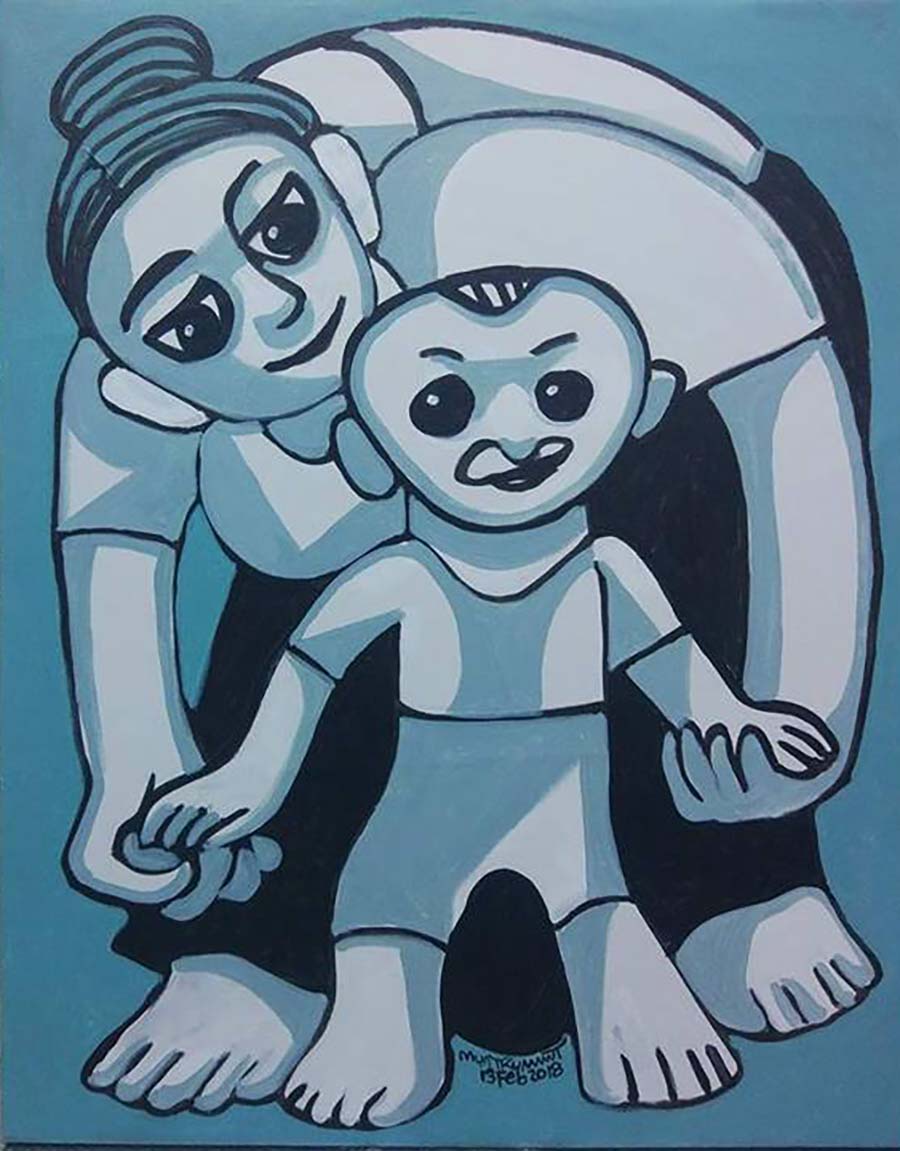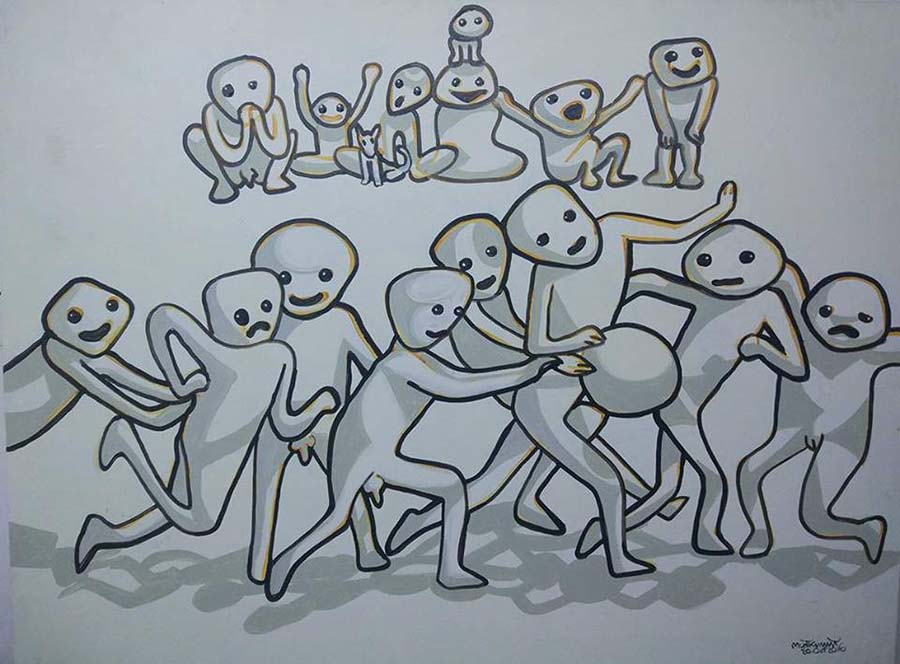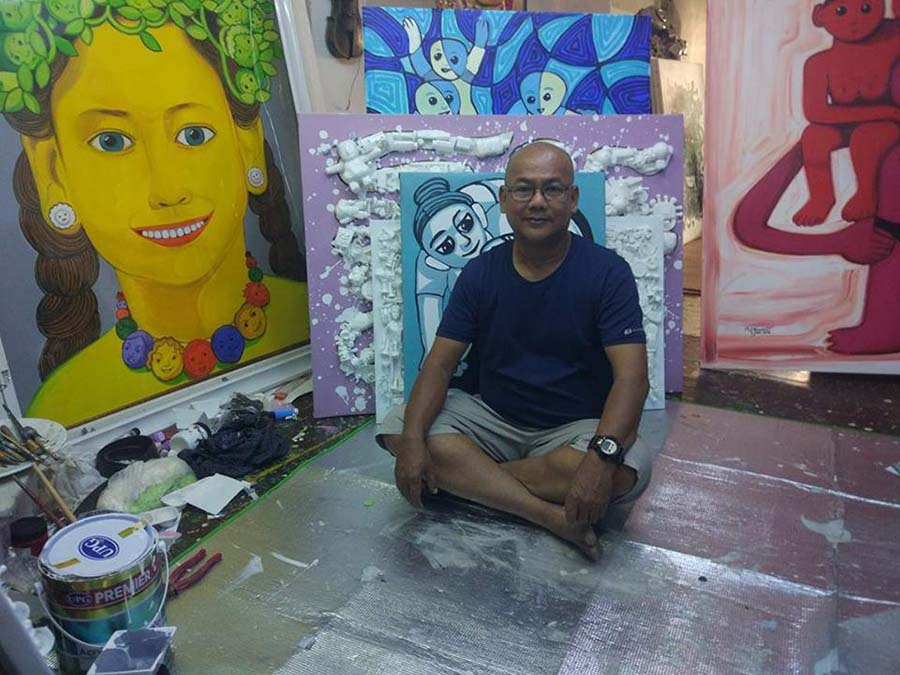The Irrawaddy Magazine |
- KIA Reports Second Offensive by Tatmadaw This Year
- Remembering Myanmar’s Unsung Heroes — Its Women
- Experience Inle Cuisine With a Cooking Class
- National Mining Policy Needs Total ‘Rethink,’ Report Finds
- Daw Aung San Suu Kyi Says Rule of Law Must Come First
- Mandalay Revives Traditional Thingyan Nights to Attract Visitors
- Holocaust Museum Strips Suu Kyi of Award
- Govt Greenlights Electricity Joint Ventures in Mon State, Bago Region
- Profiles in Empowerment
- Rakhine Govt Building Ring Road on Popular Island Off Ngapali Beach
- Artist Responds to Disaster with Love
- Grenade Blast Kills One in Sri Lanka Communal Violence, Social Media Blocked
- Violence Against Women and Girls Still a Global Problem
- Myanmar Police Witness Says Searched Reuters Reporter’s Home ‘For News’
- ‘Rowdy monks’ or a Crisis of Monastic Authority?
| KIA Reports Second Offensive by Tatmadaw This Year Posted: 08 Mar 2018 06:46 AM PST
YANGON — The Kachin Independence Army (KIA) says the Myanmar military, or Tatmadaw, launched a second offensive against its forces in Kachin State’s Tanai Township on Saturday. "They started a military offensive again in the Tanai area. Their offensive this time is heading toward our KIA Battalion 14," Colonel Naw Bu, a spokesman for the ethnic armed group, told The Irrawaddy on Thursday. "There was a strong military push on March 5 and 6," he said. The Tatmadaw launched its first offensive against the KIA in January, seized some amber and gold mining areas in Tanai and driving hundreds of ethnic Kachin out of the area. "They could not reach the area KIA Battalion 14 controls during their first offensive, so they are trying to get there this time," Col. Naw Bu said. "They [the Tatmadaw] used only ground forces this time to attack our troops. They have not used the air force yet," he said, adding that the KIA battalion was pushed back from some areas in the past few days. Locals said the fighting has prevented them from reaching their paddy fields and that Tatmadaw checkpoints around the town of Tanai, home to some 900 displaced Kachin, were hampering their travel. They said they heard shelling throughout most of Monday and Tuesday. "The fighting is quiet today, but we could hear explosions from artillery all day on March 5 and 6," said Naw Tawng, a Tanai resident helping the displaced families. The Tatmadaw will celebrate Armed Force Day on March 27 in Naypyitaw. It has often launched offensives against the area’s ethnic armed groups ahead of the annual event, at which it typically hands out awards to soldiers who have distinguished themselves in the fighting. Another of the armed groups, the Ta’ang National Liberation Army (TNLA), reported a clash with the Tatmadaw on Thursday in northern Shan State. It said the Tatmadaw has brought some 50 trucks to the area for what it believes may be a full-on offensive against the TNLA. The TNLA says it engaged with the Tatmadaw in 14 clashes last month. The post KIA Reports Second Offensive by Tatmadaw This Year appeared first on The Irrawaddy. |
| Remembering Myanmar’s Unsung Heroes — Its Women Posted: 08 Mar 2018 06:34 AM PST To mark International Women's Day, I embrace this opportunity to honor the countless women who have dedicated and continue to dedicate their lives to their families, communities and countries with loving kindness, empathy, courage and the many other qualities their male counterparts so often lack. Unavoidably for me, first among these women is my late mother. My mother not only led our family as a breadwinner, she also raised her boys to think rationally and justly and backed her rebellious sons when they opposed oppressive regimes right up until she met her ill-fated death, her body crushed by a Hino vehicle carrying Air Force personnel as she was making her way back home. That was in August 1994 — more than two years after I was thrown into jail for my political activism. I am certain that as she took her last breath on that spot, at the age 49, she was thinking about what would happen during the coming week, when she was due to come and visit me in prison. (Her other son was at that moment living in exile.) Since my sentencing to 10 years in prison by a military tribunal, she had never missed a single one of the biweekly visits she was permitted to make to her political prisoner son in Insein Prison. By the time she died, she had visited the prison more than 60 times to bring me the food, medicine and other materials that not only I but also my fellow political prisoners so badly needed. But her visits were intended not only to meet my material needs, but also to provide the strong moral support I would need to survive my 10-year imprisonment. In our country under the previous military regime, it was beyond difficult and dangerous to be the mother of both a political prisoner and an exiled political activist. While running her own business to take care of the family — as well as provide for me in prison — she faced harassment, threats and intimidation from officials of the junta, known as the State Law and Order Restoration Council, in her ward and township, as well as from plainclothes officers belonging to the regime's notorious Military Intelligence apparatus. In their eyes, she was simply the mother of a prisoner and an outcast who had defied their authority. But she stood up to them until her last day. In fact, my mother was just one among countless mothers, sisters, wives and individual women in Myanmar who bravely endured similar or even worse situations under one of a series of authoritarian regimes from 1962 to 2010. Other women took even more risks to play leading roles in the fight for freedom and/or democracy throughout British colonial rule in the late 19th-century, the pre- and post- independence eras, and various authoritarian and military regimes from 1962 to 2010. We may never know how many mothers, wives, sisters and partners were victims of those oppressive systems and the abusive individuals who did their bidding. Nor will we ever fully appreciated the extent to which so many of them managed to overcome these hardships. Throughout Myanmar's history, women have always been at the forefront of efforts to combat oppression and promote democracy. In the early 20th century, when the country was under colonial rule, women were active in the nationalist movement that led to independence in 1948. With independence restored, the role of women in politics and other sectors was more vital than ever. But their role, especially in politics, diminished after the military staged a coup in 1962. Women were marginalized in the male-dominated regime. The period between 1962 and 1988 under the rule of late dictator Ne Win can be seen as a kind of "dark age" for women. But when we took to the streets to topple the authoritarian regime during the 1988 pro-democracy uprising, young female students in my classrooms joined the movement along with women from every sector. Win Maw Oo was just one example of how bravely women and girls took to the forefront of the movement, staring down the regime's rifle barrels. She was just 16 when she was gunned down in downtown Yangon on Sept. 19, 1988, the day after the military staged a bloody coup. Several hundred female political activists were among those of us locked up for lengthy terms in cells at prisons across the country. Some might wonder how those female political prisoners managed to overcome such hardships in prisons. Some of those women are today sitting in national and regional parliaments as lawmakers elected in the 2015 general election. Women now account for 13 percent of the members of the country's legislative assemblies — an unprecedented though still unsatisfactory level. But the majority of Myanmar people – both male and female – showed in the 1990 and 2015 elections that they are ready to accept women as their leaders or representatives if they are capable. Led by Daw Aung San Suu Kyi, the National League for Democracy won both elections in landslides. Some ethnic women candidates won seats in their constituencies as well. In Myanmar, which was closed off to the world by authoritarian and military rulers for nearly five decades, there are bound to be many people who cling to old-fashioned political and social norms. For an individual person to be able to recognize women's endeavors, sacrifices and achievements, they must be able to change their view and mindset. For an institution or administration, including the incumbent government, it will require policies or decisions that create an environment in which women – half of Myanmar's more than 51 million people – can fulfill their important roles — which are not limited to nurturing families, but extend to leading their country to a better future — with all their strengths and abilities. The post Remembering Myanmar's Unsung Heroes — Its Women appeared first on The Irrawaddy. |
| Experience Inle Cuisine With a Cooking Class Posted: 08 Mar 2018 04:35 AM PST NYAUNG SHWE, Shan State — For visitors to Inle Lake, in southern Shan State, the town of Nyaung Shwe is the main access point. A few weeks ago, I visited Inle with a list of things to do around Nyaung Shwe. And since a cooking classis is the best way to get to know any new place, it was at the top of my list. I booked my class at the popular Sin Yaw Guest House. Students need to book their place a day ahead because the owner, Sao, needs to prepare the ingredients and other things.  When you book, Sao will ask if you want to go shopping with her at the market. I decided to skip the market because I didn’t have enough time, so they bought all the ingredients for me. When I arrived at Sin Yaw's rooftop classroom, it was about 10 a.m. and Sao was waiting for me and my friend with a table prepared with a small gas stove, vegetables and other ingredients. Students can choose the menu for their class. I chose a few fast and easy dishes including Inle potato rice, Inle fish curry with spring onions for the main dish, tomato salad, and potato and green bean curry. Other options include Inle fried spring onion with pork, Shan chicken salad, and Shan style chicken or pork with pineapple and cashew nuts.  Sao was very helpful and patient in answering our questions, walking us through the class step by step. She and her staff had already cleaned the vegetables and prepared the fish for us. We just had to cook them following their instructions to end up with a delicious Inle meal. We started by boiling the potato and tomato for the Inle potato rice, which took 45 minutes to prepare. While they boiled away, we rubbed a large stone fish from Inle Lake with salt and turmeric and fried it in hot oil for the Inle fish curry with spring onions. We chopped the onions and tomatoes into small pieces for the gravy and cooked them until they were soft, then added some salt and chicken powder.  The smell was sweet and made us hungry. We poured the gravy over the fish and the dish was ready. We moved on to the Inle style tomato salad. What sets it apart from other tomato salad is the liberal use of crushed roasted peanuts. It was not difficult to make. We just had to mix the onion and tomato with the nuts and add salt. By this time the boiled potato and tomato were ready and I peeled off the skins. Then we cut the potato into flat slices, mushed them with some Shan rice and salt, pressed a few of the balls into pancakes and sprinkled them with some roasted nuts. The Inle potato rice was ready to eat. Sao said the last side dish, the potato and green been curry, was especially popular among the Innthar, or people of Inle, many of whom eat it every day. My friend cooked that one while I prepared the potato rice.  The cooking class lasted about three hours and cost 15,000 kyat ($11.22) per person. We used tomatoes in every dishes. The Innthar eat a lot of tomatoes because they have many floating tomato farms on Inle Lake. We had a lot of fun. We learned all about the ingredients and what was going on with each dish. Sao and her two staff were lovely and very friendly. All the dishes we cooked were tasty and we ate them all after class. Our lunch came with bottled water and watermelon. I'm not an expert cook, but it was lovely to try and nice to learn about a new place through its traditional cuisine. Nyaung Shwe has a few other cooking class options, and you should definitely try one if you’re in town. If you have the time, I recommend taking the trip to the market to see where the ingredients come from. To book a class with the Sin Yaw Guest House, you can send a message to its Facebook page, Sin Yaw Guest House and Restaurant, or call 09 960 743217.
The post Experience Inle Cuisine With a Cooking Class appeared first on The Irrawaddy. |
| National Mining Policy Needs Total ‘Rethink,’ Report Finds Posted: 08 Mar 2018 04:13 AM PST CHIANG MAI, Thailand — Myanmar needs a new mineral resources policy and fresh laws developed through a transparent and consultative process if the mining sector is ever to be sustainable, the Myanmar Center for Responsible Business (MCRB) said at the launch of a sector-wide impact assessment (SWIA) report on March 8. The fourth SWIA based on MCRB's field research focused on mining of three commodities: tin, gold and limestone. In 2016, field researchers investigated a total of 41 mine sites in eight areas: Shan, Karen, Karenni and Kachin States, and Bago, Sagaing, Mandalay and Tanintharyi regions. Among them were 11 large-scale permitted operational mine sites (of which one was in the exploration phase), 15 small-scale permitted mine sites, and 15 informal mining areas of various sizes. Based on the many negative impacts on the environment and on mine workers observed by the researchers, the MCRB said in a press release that to achieve responsible mining, "The entire approach to mining in Myanmar needs a rethink." "Most of the harms were felt by workers — including women and children — and borne by the environment. A rethink is also needed if Myanmar is to develop the modern mineral rights cadaster it needs to meet EITI standards. A fresh start, a clear policy vision, and simple laws to underpin it, are essential if mining is ever to contribute to sustainable development in Myanmar," it said. EITI refers to the Extractive Industries Transparency Initiative. MCRB identified five key challenges based on field research and an extensive review of current laws and initiatives. These are: a lack of clarity on policies, laws and regulations relevant to mining activities, which inhibit responsible investment; the limited capacity of government and business actors to monitor and address the environmental, social and human rights impacts of mining; the externalization of the environmental, social and human rights costs of mining on local communities; problematic governance of mining in conflict-affected areas; and extensive informality in the mining sector. Vicky Bowman, the director of MCRB, said at the launch of the SWIA in Yangon that the development of mining sector regulation in Myanmar over the past two decades has been based on the 1994 Mining Law, which she said is outdated. "The legal framework is also fragmented between mining and gemstones," she said, adding that the 2015 Amendments to the Mining Law only made minor changes. New rules imposed this year and based on those amendments have only tinkered at the edges of reform, she said. The existing Mining Law developed under the former State Law and Order Restoration Council (SLORC) "was designed at a time when mining, and oil and gas, both fell under the same minister [Vice Admiral Maung Maung Khin] and [this continued] even after amendment in 2015," she told The Irrawaddy. Vice Admiral Maung Maung Khin was Myanmar's deputy prime minister under the SLORC. Bowman explained that the 1994 Mining Law "favors use of production sharing contracts [PSCs] in mining, which are used in the oil and gas industry. However almost no other country in the world uses PSCs for mining, as the commercial risks in mining are different to oil and gas. Furthermore, it does not establish a mining cadaster, which is the fundamental basis for managing mining transparently and attracting investment." She pointed out that although additional elements related to the environment, health and safety have been introduced, these are either unclear or not in line with international good practice. "If the law is compared to other countries' mining laws such as Mongolia or Peru, with whom Myanmar is competing to attract investment, the weaknesses are evident," she added. The MCRB director said the current Ministry of Natural Resources and Environmental Conservation (MONREC)'s decision to consider adopting a Mineral Resources Policy was "a positive step." "But it needs to be done as part of a transparent, cross-government and multi-stakeholder process, [and] have concrete actions that incorporate modern international standards. It also needs to be developed in a way which supports the peace process and EITI, the National Environmental Policy and the draft Myanmar Sustainable Development Plan," she said.  Claus Teilmann Petersen, director of the Human Rights and Development think tank at the Danish Institute for Human Rights (DIHR), was quoted in the press statement as welcoming the government's intention "to formalize artisanal and subsistence mining [ASM] rather than outlaw it.” Teilmann Petersen, an expert on the relationship between business and human rights standards, emphasized that although ASM has serious negative impacts on human rights and the environment, it also benefits thousands of poor people. "Formalizing artisanal mining is a difficult task," he said. "It can't simply be addressed by a new set of rules on licensing." He suggested Myanmar take lessons from other countries that have followed the ASM track. "One lesson for putting together an affective Artisanal and Subsistence Mining (ASM) Management Strategy is that governments need to consult with all stakeholders, including the subsistence miners themselves," he said. "Their right to livelihood will be affected by an approach which doesn't take the specific nature of ASM into account," he added.
The post National Mining Policy Needs Total 'Rethink,' Report Finds appeared first on The Irrawaddy. |
| Daw Aung San Suu Kyi Says Rule of Law Must Come First Posted: 08 Mar 2018 03:59 AM PST NAYPYITAW — The misconduct of civil servants can ultimately undermine public confidence in the government, State Counselor Daw Aung San Suu Kyi said in a public address on Wednesday. "When administrative measures and decisions are made without reference to the relevant laws and regulations, it leads to poor use of due discretion and can results in biased decision making," the country’s de facto leaders said in her remarks at the Rule of Law: Conference on Justice Sector Coordination in Naypyitaw. "As a result, failing to reference the legal basis for decisions by civil servants will negatively impact the rule of law and make people less confident in the government." She urged civil servants to carry out their duties selflessly and with good intentions because they are serving the public. The general administration department, courts, law offices and police forces play crucial roles in implementing the rule of law effectively and are responsible for protecting the public, she said. "A great many of the complaints sent to higher authorities are concerned with the police," she added. "If the public is afraid to seek help from the police or does not wish to come forward about a criminal matter, the relationship and cooperation between the public and the police will deteriorate. Consequently, the rule of law will stumble." U Thein Than Oo, of the Independent Lawyers' Association of Myanmar, said the capacity of law enforcement personnel was limited and that the rule of law was too weak in Myanmar. "Aung Win Khaing [a suspect in last year’s assassination of prominent lawyer U Ko Ni] is at large, and people criticize that two Reuters reporters were set up," he said. According to the 2008 Constitution, the lawyer said, the military-run Home Affairs Ministry — and in particular the police force and general administration department, which it oversees — were mainly responsible for these cases. He said the civilian government was next in line. Thein Than Oo blamed the lack of rule of law on the lack of cooperation between departments. "Departments should not work as an entity and make decisions on their own. Rather, they should cooperate with each other," he said. If good laws only exist in books and are not applied to people’s lives, the rule of law cannot be said to exist, Daw Aung San Suu Kyi said. Her National League for Democracy party contested the 2015 election with its eyes fixed on the rule of law, she added. "Only with the rule of law can other things succeed, for example peace. Some argue that peace should be the top priority, not the rule of law. But without the rule of law, peace will not last long," she said. The rule of law, peace and the stability of the country were interconnected and the concern and responsibility of every single citizen, said Daw Aung San Suu Kyi. She urged civil servants not to perform their duties only when there were complaints, but to provide their services dutifully and responsibly. "To improve the broader governance practices of the public sector, accountability and transparency in decision making and complaints handling are necessary," she said. The two-day conference, which ends Thursday, was organized by the Attorney General's Office to facilitate discussion on the challenges facing the rule of law in Myanmar and how to improve it. Translated from Burmese by Thet Ko Ko. The post Daw Aung San Suu Kyi Says Rule of Law Must Come First appeared first on The Irrawaddy. |
| Mandalay Revives Traditional Thingyan Nights to Attract Visitors Posted: 08 Mar 2018 02:38 AM PST MANDALAY — The Mandalay City Development Committee (MCDC) is planning to revive traditional Burmese Thingyan nights to attract more visitors during the upcoming celebrations. After success last year with a traditional Thingyan night walkway, the MCDC will repeat its efforts. By separating the old and new celebrations, it hopes to attract more visitors. High-pressure sprays, DJs and pavilions will still be on some sides of the Mandalay Palace moat, but the south side outside the old palace will be a strolling walkway, with no vehicles allowed. "The Thingyan night walkway will attract visitors who want to enjoy Mandalay nightlife but in a traditional fashion," U Kyaw Yin Myint, an MCDC committee member, told The Irrawaddy. According to the MCDC, local and foreign visitors increased considerably last year, largely because of the traditional walkway along the southern palace wall.  Visitors will be able to enjoy traditional delicacies, puppet shows and classic Myanmar films. Along with a number of bookstores and souvenir shops, the Thingyan night walkway will be open from 7 p.m. to 11 p.m. during the festival. "We are taking great care to have fresh, quality food to sell at the walking street," said U Kyaw Yin Myint. "Our target is to revive tradition and create a major festive attraction in the country while also letting the youth be current," he added. The Thingyan water festival is the annual celebration for Myanmar New Year. Many Myanmar people believe that throwing water on others before New Year's Day will wash away the bad things from the prior year. People used to use cups and buckets to politely pour water on each other but pressured water pumps and sprays have become popular in recent years. This year, Thingyan celebrations will run from April 13 to 17. The post Mandalay Revives Traditional Thingyan Nights to Attract Visitors appeared first on The Irrawaddy. |
| Holocaust Museum Strips Suu Kyi of Award Posted: 08 Mar 2018 02:19 AM PST YANGON — The Myanmar Embassy in Washington, D.C., stated that the United States Holocaust Memorial Museum was "misled and exploited by people who failed to see the true situation in Rakhine State" upon the museum's revocation of its Elie Wiesel Award from Daw Aung San Suu Kyi. The museum released an announcement on Tuesday about the withdrawal of the award that they honored her with in 2012, stating that the Myanmar State Counselor had failed to use her moral authority to address the Myanmar military's orchestration of crimes against Rohingya Muslims. More than 680,000 Rohingya have fled to Bangladesh after army clearance operations in northern Rakhine State since August last year in the wake of serial attacks on security outposts in the region by the Arakan Rohingya Salvation Army. Those who made it to camps on the Bangladeshi side reported arbitrary killings, rapes and torching of property by the Myanmar Army. The UN labeled the actions as ethnic cleansing. In its statement, the museum dedicated to Nazi's victims of World War II said it "had hoped Daw Aung San Suu Kyi would have done something to condemn and stop the military's brutal campaign and to express solidarity with the targeted Rohingya population" as someone celebrated for her commitment to human dignity and universal human rights. "We understand the difficult situation you must face in confronting decades of military misrule and violence in your country and that institution's still powerful constitutional role. However, the military's orchestration of the crimes against Rohingya and the severity of the atrocities in recent months demand that you use your moral authority to address this situation," said the statement. On Wednesday, The Myanmar Embassy in Washington said: "We immensely regret that the United States Holocaust Memorial Museum has been misled and exploited by people who failed to see the true situation in fair judgment on the situation in Rakhine State." It continued that the decision of the museum would have "no bearing on the determination of Myanmar people in supporting the leadership of the State Counselor Daw Aung San Suu Kyi in nation-building but will make the government to redouble its effort in finding a lasting solution in Rakhine State." The museum is the first US institution to revoke an award from Daw Aung San Suu Kyi. Since last year, the Nobel laureate has had at least three honors stripped, including the Freedom of the City awards by Oxford, Glasgow and Sheffield City Councils and the Honorary Presidency award by the London School of Economics. The post Holocaust Museum Strips Suu Kyi of Award appeared first on The Irrawaddy. |
| Govt Greenlights Electricity Joint Ventures in Mon State, Bago Region Posted: 08 Mar 2018 02:01 AM PST YANGON — The Myanmar Investment Commission (MIC) has granted permission to two joint ventures involving foreign partners to supply power to areas not connected to the national grid. "One is for households in Ye Township, and the other is for the developer of an industrial zone in Bago," said U Than Aung Kyaw, deputy director-general of the Directorate of Investment and Company Administration (DICA), at a press conference on Monday. The Southern Myanmar Development Co., a Singapore-Thai-Myanmar joint venture, won a contract to supply electricity to villages in Ye Township, Mon State. According to DICA, the 26-billion-kyat project will generate 10 megawatts of electricity daily with a diesel generator. The Singapore and Thai partners each hold 33 percent in the venture, while the local partner holds 34 percent. i-Land Park Myanmar Co., an 80-20 Singapore-Myanmar venture with initial investment of $23.18 billion, will supply 19 megawatts to Singapore-backed i-Land Park Myanmar Industrial Zone in Bago Region. It will use a type of fuel to generate electricity, DICA said. According to MIC's statistics, in the current fiscal year, Myanmar citizens have invested 172,267.324 million kyats in four electricity-supply projects, and foreigners have invested $405.774 million in five projects. Up to 70 percent of the country's population, the majority of them living in rural areas, has yet to be connected to the national power grid, DICA said. Myanmar Oil and Gas Services Society Chairman U Kyaw Kyaw Hlaing said: "Most of the rural areas are out of reach of the national grid. Even if they get electricity from private suppliers, locals have to pay 250 to 300 kyats per unit of electricity, which is five times the rate in Yangon." "The government should be fair to the whole country. It is not fair that electricity prices are cheap in Yangon and high in rural areas," he added. "It is good that foreigners are investing in the electricity sector; the more investment, the better. But it is more important that electricity prices fall," he said. "Rich people use a lot of electricity. The government said it loses [money] for every unit it produces. This means it is subsidizing power for the wealthy. The government should change. Only then will it be fair," he added. The government spends about 333 billion kyats annually on electricity subsidies, according to figures from the Ministry of Electricity and Energy. According to the 2014 national census, 77.5 percent of the urban population uses electricity, but in rural areas, the percentage is just 14.9 percent. Domestic electricity consumption increases by 15 percent every year, according to the ministry. Currently, households pay 35 kyats per unit up to 100 units and 40 kyats per unit up to 200 units. Above 200 units the rate is 50 kyats. Industrial users pay 75 kyats per unit up to 500 units, 100 kyats from 501-10,000 units, 125 kyats from 10,001-50,000 units, and 150 kyats from 50,001 to 300,000 units. The unit price drops to 100 kyats for usage above 300,000 units. The post Govt Greenlights Electricity Joint Ventures in Mon State, Bago Region appeared first on The Irrawaddy. |
| Posted: 08 Mar 2018 01:53 AM PST In honor of International Women's Day on Thursday, The Irrawaddy revisits a selection of stories from the past five years featuring noteworthy women involved in a diverse range of fields. The women include a filmmaker, self-defense instructor, human rights activist, harpist, yoga instructor, company founder, peace activist, UN award winner, democracy activist and journalist. They are just a few of the many women – who together comprise half of our nation – making notable contributions to the country's social and economic development, while helping to bring peace and understanding to our society. Let's work together to make a world of equality for all, in which there is no place for discrimination.
The Kachin Journalist Breaking Stereotypes "It was my dream to start up a local publication that reflects local needs, reports on the huge human rights violations and raises people’s concerns," said Seng Mai Maran.
Young Filmmaker Counters LGBT Stereotypes After fighting media-fueled discrimination at school, now Hnin Pa Pa Soe is taking on the censors.
'Women have their own rights, and not because they are given by men,' says a co-founder of the Myanmar Women's Self-defense Center.
Changing the Lives of Displaced Children Ethnic Kachin Lamai Mai Mai has dedicated her life to displaced youth, her latest project helps children with orofacial clefts.
UN Award Winner Fights for Myanmar's Women Cheery Zahau, a winner of the UN's N-Peace Awards for 2017, says gender equality is not only good for women, but for the whole country.
The Irrawaddy profiles seven women who were involved in or inspired by the events of 1988.
Harpist Hopes to Improve Music Education After decades of studying and practicing, Su Zar Zar hopes to preserve the musical tradition she became enamored with as a child.
Teacher Nan Su Kay Swan reflects on nearly 20 years of practice, and the evolution of yoga from a physical challenge to a devotion to mindfulness.
Local Marketing Agency Combats Discrimination and Stereotypes The Irrawaddy interviews the agency's founder about Myanmar's digital landscape, digital rights and feminism.
Su Su Lwin: Not 'The' Lady, but Rather Burma's Next 'First' Lady After years promoting education and supporting Suu Kyi and the NLD from the sidelines, Su Su Lwin steps into the spotlight, as Burma's new first lady.
For One Kachin Woman, Peace-Brokering is in the Blood Ja Nan, an ethnic Kachin peace facilitator, is one of only a handful of women privy to the inner workings of Burma's ceasefire negotiations.
Back With a Mission: Empowering Women in Burma Lway Aye Nang travels to some of Burma's most remote areas to scout for promising political talent.
In Crusading for Peace and Empowering Women, Kachin Activist Finds a Calling May Sabe Phyu says she can't sit around and wait for others to change Burma, where women are marginalized and civil war still simmers. The post Profiles in Empowerment appeared first on The Irrawaddy. |
| Rakhine Govt Building Ring Road on Popular Island Off Ngapali Beach Posted: 07 Mar 2018 11:56 PM PST YANGON — The Rakhine State government is building a ring road on a popular island off its southern coast in hopes of drawing more tourists to Ngapali beach, though some fear the environmental fallout. During Tuesday’s session of the state Parliament, Hotels and Tourism Minister U Kyaw Aye Thein, who also serves as Rakhine’s minister of finance, planning and economy, said construction had started recently, according to lawmaker U Naing Kywe Aye, Thandwe (2). U Naing Kywe Aye said he had asked whether the local government was developing Pearl Island, also known as Apaw-Ye Kyun, with minimal impact on its biodiversity, which could attract international holidaymakers. Lured by its deep blue waters and white sand beach, many visitors to Ngapali take the 10-minute boat ride to the island. This summer, nearly 100 foreigners and a thousand locals have made the trip daily.  According to U Naing Kywe Aye, the tourism minister said the ring road would be mainly for walking and cycling and that the government would invite interested investors to further develop the island under the state’s supervision. The island already has a helicopter landing pad, a viewing tower, and a few modest restaurants operating without business licenses. Some locals — recalling the fallout from past development projects — are wary of seeing the island developed further. Aung Aung, a Ngapali boat operator, told The Irrawaddy that trees were being felled to make way for the new road. He feared yet more damage to the island’s ecosystem if dynamite is used to source local rocks for a retaining wall, a move he said could also drain the beach of its white sand in the rainy season. "Leaving Pearl Island alone is the best way to preserve its natural beauty", Aung Aung said. He said more visitors would also generate more trash, which, if not properly managed, could end up driving tourist numbers to Ngapali down again. Oliver Esser Soe Thet, who owns a local hotel and consults the government on sustainable development, said Pearl Island’s bats and eagles were also among its main attractions but complained that its unregulated restaurants have turned it into a virtual “garbage dump,” drawing complaints from visitors and boat operators alike, but to little effect. He urged Rakhine State Chief Minister U Nyi Pu to consult with both local and international experts on how to protect the area’s natural environment, including garbage and waste management systems. He also suggested learning from eco-tourism ventures elsewhere that operate their own gardens and playing up the local area’s traditions and customs, possibly even reviving its pearl breeding industry. “Make Rakhine history alive,” he said. The ring road will run about 3.2 km around the island, which covers less than half a square kilometer.  Locals gave the island its name based on the pearl breeding project the government started there in the 1970s. The state-owned enterprise successfully produced natural pearls, including the prized Tahitian black pearl variety. But it came to an abrupt end in 1990 when nearly 100 pearls were stolen, including about 10 black pearls. U Kyaw Aye Thein, the tourism and finance minister, could not be reached for comment. The post Rakhine Govt Building Ring Road on Popular Island Off Ngapali Beach appeared first on The Irrawaddy. |
| Artist Responds to Disaster with Love Posted: 07 Mar 2018 11:22 PM PST A Myanmar artist is concerned for the world. There have been deadly shootings at schools in the United States. Extremists have executed reporters. Around the world, there are wars, natural disasters and epidemics. And Myanmar is no exception. There is considerable uncertainty about its political transition. "Faced with all this, I've thought about how I can respond as an artist, what artistic creation I can make. I decided to create works about peace and love. I drew families, symbols of peace, and Nobel peace laurates," said Myat Kyawt.
His paintings depict toy doves, happy families and children playing. There is also an installation about families. In one piece, a mother helps her toddler walk. "The new government came to power with love. It even created opportunities for its enemies. It carried out a revolution with love and created change for more than 50 million people. I have dedicated my work to these causes," said Myat Kyawt.  Myat Kyawt has been making art for decades, but he never seems to run out of new ideas and ways to approach his craft. He is never satisfied with simply creating new things, and has continuously created performance art depicting love and unity. In one of his performances, he carried a painting into crowds. "This is what I call brining art to the people. Children, grandmas, and women liked it very much," said Myat Kyawt.  His exhibition 'Great Love Line' will be on display through Friday at OK Art Gallery at Aung San Stadium (North Wing) in Yangon. There will be a total of 30 pictures, 15 paintings, four installations, as well as a performance at the exhibition. Myat Kyawt has so far organized 15 solo shows and dozens of group exhibitions at home and abroad.  He has won awards and his paintings have been collected by museums in Germany, New Zealand and Singapore. "Art can by one way or another affect the human race. Art is to me the virtue of serving the interests of mankind," said Myat Kyawt. The post Artist Responds to Disaster with Love appeared first on The Irrawaddy. |
| Grenade Blast Kills One in Sri Lanka Communal Violence, Social Media Blocked Posted: 07 Mar 2018 09:03 PM PST COLOMBO — A grenade blast killed one person in further violence between majority Buddhist Sinhalese and minority Muslims in Sri Lanka on Wednesday as the government moved to block social messaging networks in an effort to halt the bloodshed. The South Asian country has been rocked by communal clashes in its central highlands since Sunday following attacks on Muslims by nationalist Sinhalese crowds. Communal tensions have grown over the past year with some hardline Buddhist groups accusing Muslims of forcing people to convert to Islam and vandalizing Buddhist archaeological sites. Muslim groups deny these allegations. Some Buddhist nationalists have also protested against the presence in Sri Lanka of Muslim Rohingya asylum seekers from mostly Buddhist Myanmar, where Buddhist nationalism has also been on the rise. Police declared a curfew until 4 p.m. Thursday in the central highlands district of Kandy, epicenter of the violence following the death of a Buddhist youth after an altercation with a group of Muslims. Buddhist mobs attacked mosques and businesses belonging to Muslims overnight, residents told Reuters on Wednesday, even after President Maithripala Sirisena decreed an emergency for seven days to curb the violence. Police spokesman Ruwan Gunasekara said there had been several disturbances throughout Tuesday night in the Kandy area, renowned for its tea plantations and scenic hills. “One person was killed and three were injured during the day after a hand grenade exploded,” Gunasekara told Reuters, without elaborating. Police have arrested seven people and three police officers were injured in the incidents, he said. The severed head of a youth was found in a mainly Muslim area in the capital Colombo, adding to tensions, residents said. Police said they were investigating. Some of the violence has been instigated by Facebook postings that threatened more attacks on Muslims, the government said. On Wednesday, it said Facebook, Viber and WhatsApp would be blocked across Sri Lanka for three days. Facebook, which owns WhatsApp, said it was working to identify and remove incitements to violence, and was in contact with the government and private organizations. “We have clear rules against hate speech and incitement to violence and work hard to keep it off our platform,” the social network said in a statement. The crisis spurred opposition parties to shelve a no-confidence motion against Prime Minister Ranil Wickremesinghe for alleged mismanagement of the economy that was originally set to be filed on Monday. On a visit to Kandy, President Maithripala Sirisena urged religious leaders to do more to rebuild inter-communal peace. Facebook Postings Muslims in Colombo said they fear for the safety of relatives living in Kandy. Mohamed Khan, a 71-year-old worker in a soap factory in Colombo, said his relatives in Kandy were in hiding. “They say the police and military are…not taking any action,” he said. Analysts said Muslim-owned businesses were being targeted, as many Sinhalese believe that the minority group holds disproportionate economic power. Sri Lanka is still healing from a 26-year civil war with Tamil separatist rebels that was plagued by atrocities and ended in 2009. Sinhalese comprise around 70 percent of the South Asian nation’s 21 million population, ethnic Tamils – who are mainly Hindu – about 13 percent, and Muslims around 9 percent. UN human rights chief Zeid Ra’ad al-Hussein said he was alarmed by recurring episodes of violence against ethnic and religious minorities in Sri Lanka and wanted accountability. “There should be no impunity, either for the incitement that led to the attacks, or the attacks themselves,” he said in a speech to the UN Human Rights Council in Geneva. The US State Department issued a security alert warning of the possibility of further unrest in Kandy. Tourism, one of the foreign exchange mainstays of Sri Lanka’s $81 billion economy, could take a serious hit from the violence as Kandy is a prime destination for foreign travellers. Kandy is located in the heart of the Indian Ocean island nation’s tea-growing region but an Indian trader said the crisis was unlikely to affect global tea markets in the near term. “This will delay shipments, but won’t have any impact on global prices, as Kenya and India have ample supplies to substitute. If supplies remain disrupted for more than a month, then prices could go up,” said a tea broker in the eastern Indian city of Kolkata. Sri Lanka is the world’s third biggest tea exporter. The post Grenade Blast Kills One in Sri Lanka Communal Violence, Social Media Blocked appeared first on The Irrawaddy. |
| Violence Against Women and Girls Still a Global Problem Posted: 07 Mar 2018 08:51 PM PST Today, Myanmar and countries around the world are celebrating International Women's Day. Since its inception roughly 110 years ago, International Women's Day has provided a forum for women to protest discrimination and express solidarity across religious, ethnic, and social divides. Without question, International Women's Day has played a critical role in increasing awareness of gender equality issues around the world and in catalyzing action to end gender-based discrimination. Today, International Women's Day is taking place against a backdrop of unprecedented social mobilization for women's rights and gender equality globally. Ending violence against and sexual harassment of women and girls, ensuring the reproductive and sexual health and rights of women and girls, and engaging male champions are the clarion call of campaigns and movements including "UNiTE to End Violence Against Women", "End Violence Now – 1 Billion Rising", "Me Too", "She Decides", "HeForShe", and "Time's Up". In Myanmar, the slogans that women's networks and organizations are rallying for today include "Press for Progress" and "It's Not OK", which aims to challenge and influence change in attitudes and behaviors that condone and tolerate violence against women and girls in Myanmar society. Global evidence demonstrates an unacceptably high prevalence of violence against women and girls in all countries, with alarming figures documented in countries in, or transitioning out of, conflict. In Myanmar, women's networks and organizations have repeatedly highlighted that violence against women and girls is pervasive and that it is a public concern that needs a well-coordinated response, rallying for a comprehensive law to prevent and prosecute violence against women and girls. Today, March 8, the Nordic diplomatic missions of Denmark, Finland, Norway and Sweden join women's networks and organizations and gender equality advocates in Myanmar in celebrating International Women's Day and in advocating for gender equality and women's empowerment. Ending violence against women and girls is fundamental to this agenda, and we urge the government of Myanmar to adopt and enact comprehensive legislation to protect women and girls from violence. Peter Lysholt Hansen is ambassador of Denmark; Riikka Laatu is ambassador of Finland; Tone Tinnes is ambassador of Norway; Johan Hallenborg is head of office of the Embassy of Sweden, Section Office Yangon. The post Violence Against Women and Girls Still a Global Problem appeared first on The Irrawaddy. |
| Myanmar Police Witness Says Searched Reuters Reporter’s Home ‘For News’ Posted: 07 Mar 2018 08:40 PM PST YANGON — Police in Myanmar searched the family home of Reuters reporter Wa Lone looking for material “related to news” the night after he and a colleague were arrested on suspicion of violating the Official Secrets Act, an officer told a court on Wednesday. Myanmar has previously denied accusations Wa Lone, 31, and fellow Reuters journalist Kyaw Soe Oo, 27, were targeted over their reporting of a crisis in northern Rakhine state. Court proceedings are under way in Yangon to decide if they will faces charges under the colonial-era Official Secrets Act, which carries a maximum penalty of 14 years in prison. Before Wednesday’s hearing a doctor examined and took blood samples from the pair at the request of the defense, after their lawyer raised concerns that their health had deteriorated in prison. Both have been in custody since their arrest on Dec. 12. Prosecution witness Police Major Soe Aung told the court he had been sent to search Wa Lone’s family home in northern Yangon on the evening of Dec. 13. Asked during cross-examination what police were looking for, he said the 10 or so police officers who entered the house were “searching in relation to news." He did not elaborate. Investigation into Killings The reporters had been working on a Reuters investigation into the killing of 10 Rohingya Muslim men who were buried in a mass grave in northern Rakhine State after being hacked to death or shot by ethnic Rakhine Buddhist villagers and soldiers. The military excavated the shallow grave in December, days after Wa Lone and Kyaw Soe Oo were arrested, saying they had received a tip-off. Authorities are taking action against 10 members of the security forces and six villagers, according to a government spokesman. “Police went my home to search about Rakhine and what we were reporting, and they surely aimed to sue us to stop our reporting,” Wa Lone told reporters during a break. Myanmar’s ambassador to the United Nations, Hau Do Suan, said last month that the journalists were not arrested for reporting a story, but were accused of “illegally possessing confidential government documents." The government prosecutor, Kyaw Min Aung, did not respond to a Reuters reporter who attempted to ask him about the case after the hearing on Wednesday. Government spokespeople have declined to comment on the case, citing the ongoing court proceedings. Soe Aung testified that during the search police found a reporters’ notebook from the Myanmar Times, where Wa Lone had worked prior to joining Reuters in 2016, that included the phone number of a leader of an ethnic Rakhine armed group, which was recorded on a police search form at the time of the search. Police also seized a broken laptop, a hard drive belonging to Wa Lone’s younger brother, and an empty bag during the search, according to the police form and Wa Lone’s family. Restaurant Meeting The reporters have said that they had been invited to meet two police officers at a northern Yangon restaurant on Dec. 12, and were arrested almost immediately after being handed rolled up papers by the policemen, whom they had not met before. Police officers have testified in court, however, that they were arrested after they were stopped and searched at a traffic checkpoint by officers who were unaware they were journalists. Also on Wednesday, Kyaw Min, a 21-year-old waiter from the restaurant where the reporters met the two police, told the court he could not remember seeing Wa Lone and Kyaw Soe Oo. Kyaw Min was the second member of the restaurant’s staff called to testify by prosecutors to say they had no knowledge of the arrest. He repeatedly told the court he could not remember details of the night of Dec. 12. Asked why he was a witness in the case, Kyaw Min said he had come forward to make a statement after being told his restaurant was mentioned in a newspaper article about the case. The hearing was adjourned until March 14. The post Myanmar Police Witness Says Searched Reuters Reporter's Home 'For News' appeared first on The Irrawaddy. |
| ‘Rowdy monks’ or a Crisis of Monastic Authority? Posted: 07 Mar 2018 05:19 PM PST The NLD government's relatively quiet campaign against nationalist monks has burst into the headlines again in the past few weeks. First, on February 21, Minister of Religious Affairs and Culture U Aung Ko made a request to the State Sangha Maha Nayaka Committee (Ma Ha Na, in its Burmese acronym) that the group step up its disciplining of monks who speak or behave in ways that disgrace the religion. Then, on February 25, another monk named Ashin Issariya (famous for his organizing role in the 2007 "Saffron Revolution" and probably better known by his pen name "King Zero") tried to hold a press conference to call on the government and Ma Ha Na to discipline U Wirathu for disrespecting Buddhism. It was disrupted by a group of aggressive "nationalist monks," which seemed to prompt another statement from U Aung Ko the following day. In this statement, he claimed that the government found it difficult to act against these monks because of a lack of consensus within society on the proper political role of monks. Hand-wringing about monks in politics is nothing new in Myanmar. Unsurprisingly, this is itself a deeply politicized topic, where one's approval of a monk's "political" activities often depends on how much those activities align with one's own political perspective. (It is also important to note the ways in which the term "political monk" has been used to delegitimize monastic activities since at least the colonial era, and regularly under previous military governments.) It may be a bit disingenuous of the minister to suggest that, in order for the authorities to be able to take action, society needs to make a definitive determination on what has always been and likely always will be an essentially contested question within Buddhist cultures. But this recent series of events shines light on how the precarity of religious authority in Myanmar today has shaped the current incarnation of "Buddhist nationalist" groups. For the last 18 months, I have been part of a research team (that also includes Dr. Ma Khin Mar Mar Kyi, Aye Thein and Saw Aung Than Wai) for the ESRC-funded project "Understanding 'Buddhist nationalism' in Myanmar." Part of our goal has been to track the nuances and variation in the phenomenon of "Buddhist nationalism" in different contexts across Myanmar, essentially disaggregating a movement that we believe is neither unitary nor unified. Crisis of Authority Recently, members of our research team gave a talk at the University of Oxford in which we positioned the emergence of Ma Ba Tha (the Organization for the Protection of Race and Religion, mostly re-branded since June 2017 as the Buddha Dhamma Parahita Foundation) within an extended crisis of religious and religio-political authority in Myanmar. (You can listen to a podcast of the talk here.) We know that the current transition has generated deeply felt anxieties regarding the resilience of Buddhism in the country. While this has been most notably and problematically directed against a perceived existential threat from Islam, there is a complementary line of concern related to the level of devotion in Buddhist practice and corresponding levels of respect for Buddhist institutions such as the sangha (monkhood). Ma Ba Tha rose to prominence amidst persistent criticisms of Ma Ha Na, which I describe briefly below. But, however much Burmese monks might resent the politically motivated centralization of the monkhood, they also seem to value the existence of the monastic authority, both because of its role in keeping discipline within the sangha and as a voice of advocacy for monks and for Buddhism, more generally. Persistent concerns that Ma Ha Na is simply a tool of the government (whichever government is in power) run alongside a sense that the organization is necessary, but no longer sufficient, for the protection of Buddhism. It is these sentiments, we argue, that created fertile ground for a group like Ma Ba Tha to emerge and occupy a crucial religio-political space. And it is disputes over the proper boundaries of that space and the role of monks and political authorities within it, that underlie recent events related to monastic discipline and governance. Criticisms of Ma Ha Na The 47 monks at the top of the Ma Ha Na hierarchy are often seen as old and out of touch with the day-to-day concerns of the monkhood and of Buddhism more broadly. Most critics stop short of claiming that individual monks within Ma Ha Na are "corrupt," but there are worries about its senior figures having become too comfortable and that their decisions have been influenced by their receiving titles and respect from high-ranking lay figures. They are particularly criticized for being under the control of the government, under whose auspices Ma Ha Na was created in the 1980s. As one monk told us, "Under normal circumstances, it's good to have an organization like Ma Ha Na. However, it shouldn't exist, as it currently does, in a position of subordination whereby it only does the government's bidding." Many monks encounter Ma Ha Na only in its regulatory capacity, and even then, their interactions would take place largely at arm's length, and only sporadically. Ma Ha Na rules monastic life from a distance, its dormant administrative mechanism becoming active only when serious problems arise, such as disputes over monastic property. Otherwise, the interactions between local monasteries and abbots and different levels of Ma Ha Na authorities remain at a bare minimum. As a result, the central organization only seems to appear in monks' lives when it is "interfering" in their affairs. At the same time, others (such as Ashin Issariya and U Aung Ko) express concerns regarding the regulation of monastic conduct in general. Ma Ha Na is supposed to undertake this purification duty and it is seen as not consistently carrying out this duty. It should be noted that this can often be a self-interested critique, in that monks strongly believe that other monks should be disciplined and held to the vinaya (rules of monastic conduct) more strictly, but see regulation of their own conduct and activities as unjustified interference. Many monks seem to want a monastic hierarchy that is not only independent of the government, but can act as a strong defender of monastic interests and of Buddhism more generally. Advocating on behalf of Buddhism would not only include engaging with the government, but taking a more active role in encouraging, managing and supporting activities that strengthen the religion, such as parahita (social work) and thathana pyu (building up the religion through the construction of religious edifices, implementing Buddhist education, or providing material support to monks). But importantly, there are (often vague and unarticulated) limits to how much monks should be involved in mundane affairs. Senior monks within Ma Ha Na might be restricted in the available actions they could take, because of the perceived dependence of Ma Ha Na on the government, the sluggish pace of the monastic bureaucracy, or because the dictates of the vinaya, while ideally providing a code of conduct for all monks, might weigh more heavily on more senior and respectable monks. Ma Ba Tha Fills a Religio-Political Vacuum This point brings us back to consideration of Ma Ba Tha's emergence as a group that straddles the religious and political spheres, and compels us to re-think its relationship with Ma Ha Na. This relationship can seem competitive and antagonistic, but recall that, even in the moments where Ma Ha Na has censured Ma Ba Tha, it has done so in very particular ways, and senior Ma Ha Na monks have continued to express support for the shared goal of protecting the Buddhist religion and Buddhist community more broadly. There is, then, a way in which monks from both groups could see their coexistence as complementary and mutually beneficial. That is, Ma Ba Tha, as a sangha-lay organization, could be seen to be in a better position to respond to perceived "emergencies," whether communal violence, natural disasters or government policies perceived as hostile to Buddhism. Of course, the other side of this is the expectation that Ma Ha Na would be more focused and effective in its areas of competency, such as in advocating for monks and maintaining discipline within the sangha. And, despite occasional harsh public criticisms of Ma Ha Na (mostly from more firebrand monks like U Wirathu), the language with which these critiques are expressed reveals the persistent influence of the monastic hierarchy and the norms that govern intra-sangha relations. Even the softest form of condemnation is made in such a way that it is carefully depersonalized. In our interviews, even monks who were strong detractors of Ma Ha Na wouldn't name particular figures within Ma Ha Na's senior leadership. Similarly, Ma Ba Tha's senior monks have always been appropriately deferential in response to Ma Ha Na's public orders against their group. Challenging or Strengthening Ma Ha Na? These intra-sangha tensions are rarely discussed in analyses of Ma Ba Tha, which usually focus on anti-Muslim attitudes— which, while still an important and consequential part of the group's ideology, are not the only relevant aspect of its existence. Because Ma Ba Tha emerged during the previous, military-aligned political administration, most analysis of the group has highlighted government support for the organization, especially in the context of the 2015 election. A more contentious relationship between Ma Ba Tha and the current NLD government has brought these critiques of Ma Ha Na back to the surface, reminding us that both religious and political authorities try to influence the other and exercise some control over the other's realm, and that religious authority in Myanmar is continuously contested and re-negotiated. Paying attention to these dynamics helps provide a more accurate picture of what Ma Ba Tha is, how it has been evolving, and where the potential fracture points are, both within the organization and within the sangha more broadly. Broader insecurities about the place, status and durability of Buddhism that circulate in Myanmar today have sometimes been directed towards the perceived external threat from Islam. But they have also been focused internally, via a discourse on inadequacies in sangha governance and a real or perceived decline in respect for monastic moral authority. While the criticisms of Ma Ha Na in the present period appear to be consistent with those expressed in past decades, they are refracted through a perceived crisis of Buddhism in present moment, occurring in the context of the expansion of political space within Myanmar and dynamics of globalization more broadly. Ma Ba Tha was not intended as a direct challenge to religious authorities in Myanmar, but it has provided an effective vehicle for carrying out activities seen as outside the scope of Ma Ha Na's remit. It has continued calls for the reform of monastic governance, while also expanding the institutional networks through which monks can conduct their religious, social and (sometimes) political activities. We can see the same dynamics present in the recent statements by U Aung Ko and Ashin Issariya. The latter is concerned about the effects that U Wirathu's words and actions might have on the reputation of Buddhism. (Ironically, some senior monks expressed exactly the same concern when they founded Ma Ba Tha almost five years ago.) The minister knows that he walks a fine line in trying to manage and discipline the sangha from the position of a layperson, with no moral authority over a monk. While the entire monkhood tries to keep these disputes hidden behind closed doors, they spill into public view in periods of heightened tension or fears related to the perpetuation of Buddhism. Myanmar's still-uncertain transition has not assuaged any of those fears, which likely means we can expect to see conflicts between monks continue, accompanied by calls for Ma Ha Na to do its job and discipline "rowdy" monks. But it also suggests that Ma Ba Tha continues to remain relevant and influential— in part because it operates in a religio-political space that the formal monastic authorities are unable or unwilling to occupy themselves. The post 'Rowdy monks' or a Crisis of Monastic Authority? appeared first on The Irrawaddy. |
| You are subscribed to email updates from The Irrawaddy. To stop receiving these emails, you may unsubscribe now. | Email delivery powered by Google |
| Google, 1600 Amphitheatre Parkway, Mountain View, CA 94043, United States | |




















